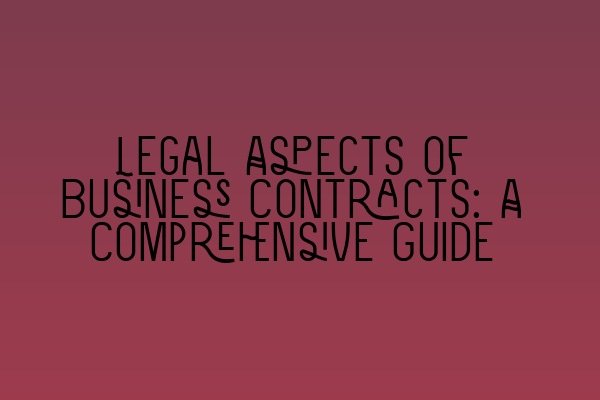Legal Aspects of Business Contracts: A Comprehensive Guide
In the world of business, contracts are the lifeblood that ensures agreements are upheld and businesses can operate smoothly. Understanding the legal aspects of business contracts is essential for any successful entrepreneur or business owner. Whether you are entering into a simple agreement or negotiating a complex commercial contract, having a solid understanding of contract law will protect your interests and help you navigate tricky legal waters.
This comprehensive guide will walk you through the essential legal aspects of business contracts, covering everything from the basics to more advanced concepts. In this article, we will explore key topics including contract formation, essential elements, contract breaches, and remedies. So, let’s dive in and arm ourselves with the knowledge needed to make informed decisions and safeguard our businesses.
1. Contract Formation
The first step in understanding business contracts is grasping the process of contract formation. Contracts are legal agreements voluntarily entered into by two or more parties. The agreement can be oral or written, but it is always best to have written documentation to avoid any misunderstandings. This section will detail the essential elements necessary for a valid contract to exist, such as offer, acceptance, consideration, and mutual intention to create legal relations.
2. Essential Elements of a Contract
To ensure a contract is valid and enforceable, certain elements must be present. We will delve into the various key elements, such as offer and acceptance, consideration, intention to create legal relations, capacity to contract, and certainty of terms. By thoroughly understanding these elements, you can ensure that your contracts are legally binding and protect your rights and interests.
3. Breach of Contract
Unfortunately, not all contracts proceed as smoothly as intended. Breaches can occur, leaving parties wondering about their legal options and potential remedies. In this section, we will discuss the various types of contract breaches, including material breaches, anticipatory breaches, and minor breaches. Understanding these different types of breaches will help you determine the appropriate course of action and potential remedies available to you.
4. Remedies for Breach of Contract
When a contract is breached, there are several remedies available to the aggrieved party. It is crucial to have a clear understanding of these remedies to pursue the appropriate course of action. This section will explore common remedies such as damages, specific performance, injunctions, and restitution. By comprehending the range of remedies, you can make informed decisions that maximize your chances of achieving a fair outcome.
By now, you should have a solid grasp of the legal aspects of business contracts, allowing you to make more informed decisions. Contracts play a fundamental role in the business world, and understanding their legal implications is critical for your success. If you would like to deepen your understanding of related legal topics or prepare for SQE exams, we recommend exploring the following articles:
– SQE 1 Practice Exam Questions
– SQE 1 Practice Mocks FLK1 FLK2
– SQE 2 Preparation Courses
– SQE 1 Preparation Courses
– SRA SQE Exam Dates
These articles provide valuable resources for further study and can help you prepare for SQE exams or enhance your knowledge to better navigate the legal intricacies of business contracts.
In conclusion, understanding the legal aspects of business contracts is crucial for any business owner or entrepreneur. By grasping the contract formation process, essential elements, breaches, and remedies, you can protect your interests and make informed decisions. Remember, when dealing with legal matters, it is always best to consult with a qualified solicitor who can provide personalized advice tailored to your specific situation.
